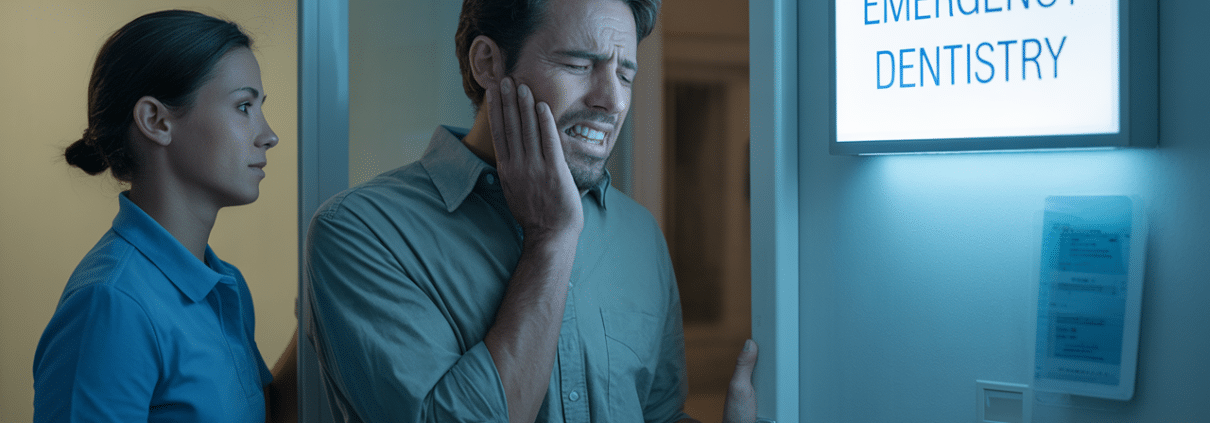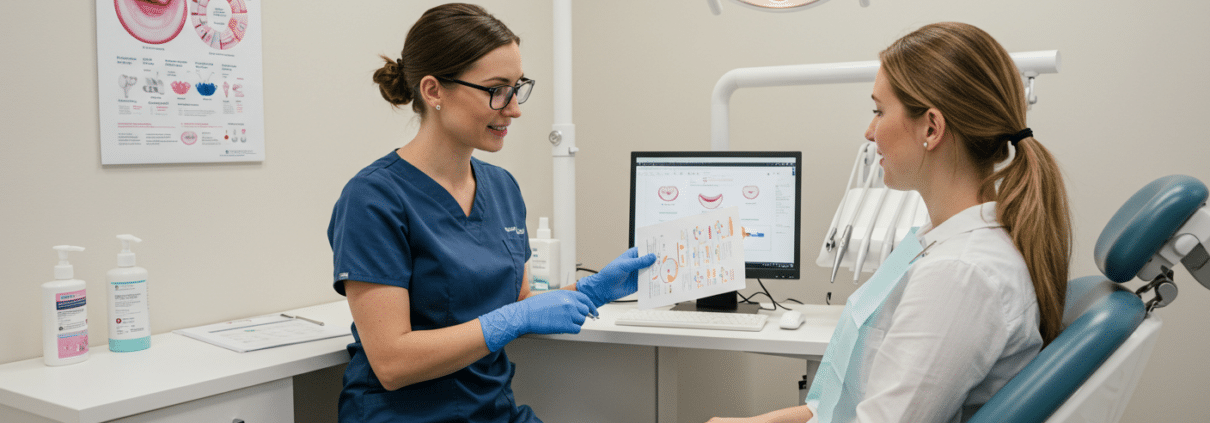Dental emergencies don’t wait for your calendar to clear—they crash in at the worst possible times. Whether it’s a cracked tooth from a late-night taco run or an unbearable toothache on Sunday morning, you need fast answers and faster relief. That’s when the search for “emergency dentist near me” begins.
But panic-googling mid-crisis is not a strategy. This blog is your calm, cool-headed guide to navigating dental disasters in real time—before the pain takes over.
TLDR – Quick Guide
- Dental Emergencies Include: Knocked-out teeth, abscesses, cracked teeth, lost fillings, bleeding gums
- First Response: Control pain and swelling, preserve knocked-out teeth, and call an emergency dentist ASAP
- Where to Go: 24/7 emergency dental clinics, on-call dental providers, or urgent care with dental support
- Cost: $100–$1,000 depending on severity and treatment
- Insurance Tip: Some PPO plans cover emergency visits—verify before treatment
Detailed Breakdown: What to Do, Where to Go, and What It Costs
1. Recognizing a Dental Emergency
Not every twinge is an emergency, but here’s what usually qualifies:
- Severe Toothache: Constant pain that radiates or worsens with pressure
- Knocked-Out Tooth: This is a race against time—ideally treated within 30 minutes
- Cracked or Broken Tooth: Especially if there’s pain, bleeding, or exposed nerves
- Dental Abscess: A painful infection that can spread fast if untreated
- Lost Filling or Crown: Can leave sensitive areas exposed
- Uncontrolled Bleeding: Post-surgery or trauma-related gum bleeding
If you’re not sure, err on the side of caution. Dental infections can become medical emergencies if ignored.
2. First Aid Before the Dentist
While you wait or travel to a clinic, take these steps:
- Knocked-Out Tooth: Rinse gently (don’t scrub), reinsert into the socket if possible, or store in milk/saline
- Swelling: Apply a cold compress to reduce inflammation
- Bleeding: Apply pressure with gauze or a clean cloth
- Pain Relief: Use over-the-counter meds like ibuprofen, NOT aspirin (it thins blood)
3. Finding an Emergency Dentist Near You
The best time to research emergency dentists is before you need one. If you’re reading this in a moment of crisis, here’s what to look for:
- 24/7 Clinics: Google “emergency dentist near me open now”
- Urgent Care Dental Providers: Some regular dentists offer emergency hours—check their voicemail or website
- Hospital ERs: If swelling or infection is affecting breathing, skip the dentist and go straight to the ER
Reliable directories like Emergency Dental Service or Zocdoc help you filter by availability and insurance.
4. What to Expect at the Appointment
Treatment depends on the issue, but common emergency services include:
- Temporary or permanent fillings
- Tooth extractions
- Root canals
- Antibiotic prescriptions for infections
- Pain management
Many emergency dentists will offer temporary fixes first, then book follow-ups for full treatment.
5. Understanding Costs and Insurance
Emergency dental care can range widely:
- Basic visit and X-rays: $100–$300
- Root canal or extraction: $500–$1,200
- Temporary crown or filling: $200–$600
Most PPO dental insurance covers emergency visits. Call your provider or check your policy details on [your insurance’s portal](https://www.deltadental.com/ or similar).
Key Takeaways
- Dental emergencies range from cracked teeth to life-threatening abscesses—know the signs.
- Act fast: preserving knocked-out teeth or controlling infections is time-sensitive.
- Find an emergency dentist near you before you need one. Store their number and hours.
- Not every ER is equipped for dental trauma, so know which local clinics handle urgent care.
- Understand costs, and know how your insurance plays into emergency visits.
FAQs
Can I go to the ER for a dental emergency?
Yes, but ERs typically handle pain and infection—not dental procedures. They may prescribe antibiotics or painkillers and refer you to a dentist for follow-up care.
What’s the fastest way to find an emergency dentist near me?
Use Google Maps with “emergency dentist near me open now” or services like Zocdoc or Emergency Dental Service to book immediately.
How do I save a knocked-out tooth?
Gently rinse it without scrubbing, place it back in the socket or keep it in milk or saline, and get to a dentist within 30 minutes.
Are emergency dental services more expensive?
Typically, yes. You’ll pay a premium for urgent scheduling and care, especially if it’s after hours or on weekends.
Will dental insurance cover emergency visits?
Most PPO plans do, especially if it involves trauma, infection, or pain. Confirm coverage details before treatment if possible.
When most people think about dental health, they picture straight teeth, not their gums. But here’s the kicker: healthy gums are the foundation of a healthy smile. Gum disease affects nearly half of U.S. adults over 30—and it doesn’t just make your breath questionable; it can also lead to tooth loss and is linked to heart disease, diabetes, and more.
So when you find yourself typing “affordable periodontist near me,” what you’re really looking for is a lifeline for your long-term oral and overall health. The good news? You can absolutely get expert care without draining your wallet.
TLDR – Quick Guide
- Periodontists Specialize In: Treating gum disease, gum surgery, implants, and gum recession
- Symptoms You Shouldn’t Ignore: Bleeding gums, bad breath, gum recession, loose teeth
- Average Cost: $200–$3,000 depending on procedure
- Savings Tips: Dental schools, in-network providers, payment plans, and discount plans
- Insurance: PPO plans often cover part of periodontal treatment, especially with a referral
Detailed Breakdown: Getting Gum Care Without the Sticker Shock
1. What a Periodontist Does
A periodontist is a dental specialist focused on diagnosing, preventing, and treating gum disease. Services include:
- Deep Cleanings (Scaling & Root Planing): Removes plaque and tartar below the gum line
- Gum Grafting: Treats gum recession
- Flap Surgery: Lifts the gums to clean roots and reduce pockets
- Dental Implants: Replaces missing teeth with surgically placed posts
- Maintenance Therapy: Regular cleanings to prevent relapse
If your general dentist refers you out, it’s because your case requires more advanced expertise.
2. Common Signs You Need a Periodontist
Don’t wait until you’re Googling “tooth fell out randomly.” These are red flags:
- Gums that bleed when you brush or floss
- Persistent bad breath or taste in the mouth
- Gums pulling away from your teeth
- Swollen, red, or tender gums
- Loose or shifting teeth
Early intervention can prevent serious (and costly) complications down the line.
3. What Periodontal Treatment Costs
Gum care isn’t cheap—but the range depends on how early you catch the issue:
- Deep Cleaning (SRP): $200–$400 per quadrant
- Gum Grafting: $600–$1,200 per site
- Laser Therapy: $1,000–$2,500
- Flap Surgery: $1,000–$3,000
- Implants (if needed): $3,000–$6,000 per tooth
That said, the long-term cost of not treating gum disease—like tooth replacement or bone loss—is much higher.
4. How to Save on Periodontal Treatment
You don’t have to choose between your gums and your grocery bill. Try these budget-friendly tactics:
- In-Network Providers: Use a periodontist covered by your dental insurance
- Dental Schools: Many schools offer discounted treatment under supervision (like at UCLA School of Dentistry)
- Payment Plans: Ask about CareCredit or in-house financing options
- Dental Discount Plans: These aren’t insurance but can slash treatment costs by 20–50%
- Preventive Visits: Regular cleanings and early treatment reduce the need for expensive surgery later
5. Choosing the Right Periodontist
Affordable doesn’t mean low-quality. Look for:
- Board Certification from the American Board of Periodontology
- Experience with similar cases
- Transparent pricing and financing
- Modern technology like laser therapy or 3D imaging
- Patient reviews that emphasize comfort and clarity
Tools like Zocdoc or your insurance provider’s directory can help you filter by location, rating, and cost.
Key Takeaways
- Periodontists are gum health experts who treat everything from gingivitis to advanced gum disease and implants.
- Costs vary widely but can be manageable with insurance, discount plans, and financing.
- Don’t wait—early treatment is cheaper, faster, and more effective.
- Look for board-certified, experienced periodontists with a clear pricing structure.
- Smart budgeting tools like dental schools and in-network providers can make care affordable.
FAQs
Is periodontal treatment covered by dental insurance?
Most PPO plans cover part of periodontal treatment, especially if medically necessary and referred by your general dentist.
What if I can’t afford a periodontist?
Check local dental schools, apply for CareCredit, or explore dental savings plans. Some providers offer sliding scale fees.
Are gum disease treatments painful?
Thanks to anesthesia and laser options, most treatments are minimally uncomfortable. Post-procedure soreness is usually manageable with OTC meds.
How long does treatment take?
Deep cleanings may take one to two sessions. Surgical procedures may require a few weeks of healing. Maintenance therapy is ongoing.
Can I prevent gum disease from coming back?
Absolutely. Regular brushing, flossing, and maintenance visits with your periodontist can keep your gums healthy for the long haul.
You finally get a break from the workweek grind, only to feel a sudden twinge in your molar—or maybe you’ve just been putting off that cleaning for months. Either way, you hit Google with the search: “dentist opens on Saturday near me.”
In neighborhoods like Los Feliz, where weekday schedules are jam-packed with film shoots, coffee shop meetings, and traffic tantrums, Saturday dental appointments aren’t a luxury—they’re a necessity. The challenge? Not all dental offices keep weekend hours, and the ones that do fill up fast.
Let’s break down how to find quality care when you actually have time for it—on a Saturday.
TLDR – Quick Guide
- Why You Need Saturday Options: For 9-to-5ers, parents, or last-minute emergencies
- What to Look For: Weekend availability, emergency readiness, online booking, in-network status
- Average Costs: Same as weekday rates, but may increase if labeled “emergency care”
- Pro Tip: Book 1–2 weeks ahead for cleanings or non-emergency visits
- Best Bet in Los Feliz: Local practices with flexible hours and high ratings on Google or Yelp
Implementation Tactics: How to Book a Saturday Dentist Without Losing Your Mind
1. Why Weekend Availability Matters
Let’s face it—weekdays are chaos. Between work, school, and traffic on the 5, who has time for a dentist appointment? That’s why Saturday hours are a game changer for:
- Working professionals
- Parents juggling multiple schedules
- Students
- Anyone experiencing minor emergencies (cracked fillings, surprise toothaches)
Saturday appointments aren’t just convenient—they’re sometimes the only option for people living in fast-paced cities like LA.
2. How to Find Dentists Open on Saturday Near You
Here’s how to search smarter, not harder:
- Use Specific Queries: “Dentist open on Saturday near me Los Feliz” will yield better results than generic searches.
- Google Maps Filters: Narrow by “Open now” or select “Hours” > “Saturday” in listings
- Try Zocdoc or Healthgrades: These platforms show real-time availability and patient reviews
- Dental Directories: Sites like DentalPlans.com help locate weekend practitioners who accept specific insurance plans
3. Don’t Just Book—Vet the Practice
Once you find a Saturday option, double-check:
- Do they offer full services on weekends, or just cleanings/emergencies?
- Are emergency slots available if something urgent comes up?
- Do they accept your insurance or offer payment plans?
Check their Google Business profile or website to confirm availability and scope of services.
4. What to Expect on a Saturday Visit
Weekend dental care in Los Feliz is often:
- Shorter staffed, so plan for slightly longer wait times
- Busy, especially in the morning or early afternoon
- Focused on maintenance or emergencies, depending on the practice
That said, many clinics now run full-service Saturdays with everything from cleanings to cosmetic consults.
5. Bonus Tip: Book Ahead or Set Recurring Appointments
Saturday slots are prime real estate. Secure your spot with:
- Advance booking: Aim for at least one week out
- Recurring appointments: Book every 6 months for preventive visits, especially if you’re a weekend warrior
Key Takeaways
- Searching “dentist open on Saturday near me” in Los Feliz isn’t just convenient—it’s smart for busy lifestyles.
- Use Google, Zocdoc, and dental directories to find qualified weekend providers.
- Vet your choice: Confirm they offer full services and accept your insurance.
- Saturday appointments can help you stay consistent with your dental health—no more skipping cleanings due to weekday chaos.
- Book early and consider setting up recurring visits to lock in your preferred slot.
FAQs
Are Saturday dental appointments more expensive?
Generally, no—most offices charge the same as weekdays unless it’s an emergency visit or after-hours case.
What types of dental services are offered on Saturdays?
Many offices offer full services, including cleanings, fillings, x-rays, and even cosmetic consults. Always confirm in advance.
How far in advance should I book a Saturday appointment?
For routine care, book at least 1–2 weeks ahead. For emergencies, call early in the day—spots fill fast.
What if I need an emergency dentist on Saturday?
Search “emergency dentist open on Saturday near me.” Some practices reserve spots for urgent care even if their books are full.
Can I walk in for a Saturday dental appointment?
Some clinics accept walk-ins, but it’s risky. Always call ahead or check online booking platforms like Zocdoc to reserve a time.



